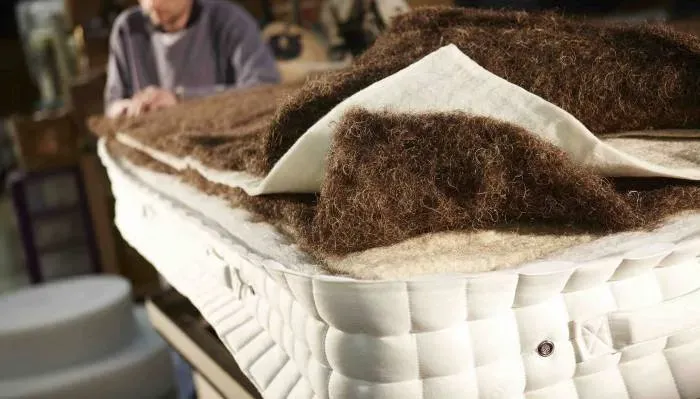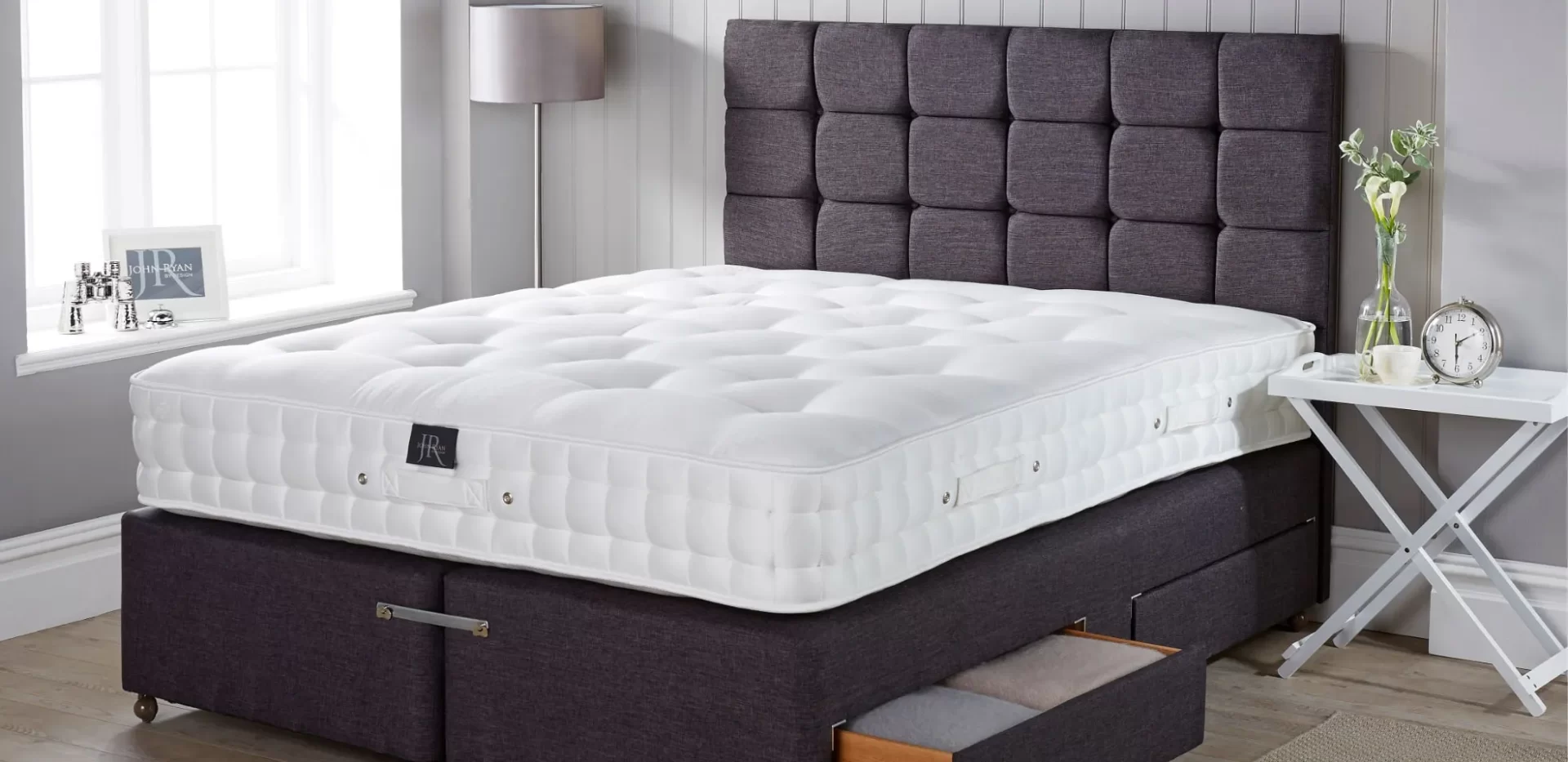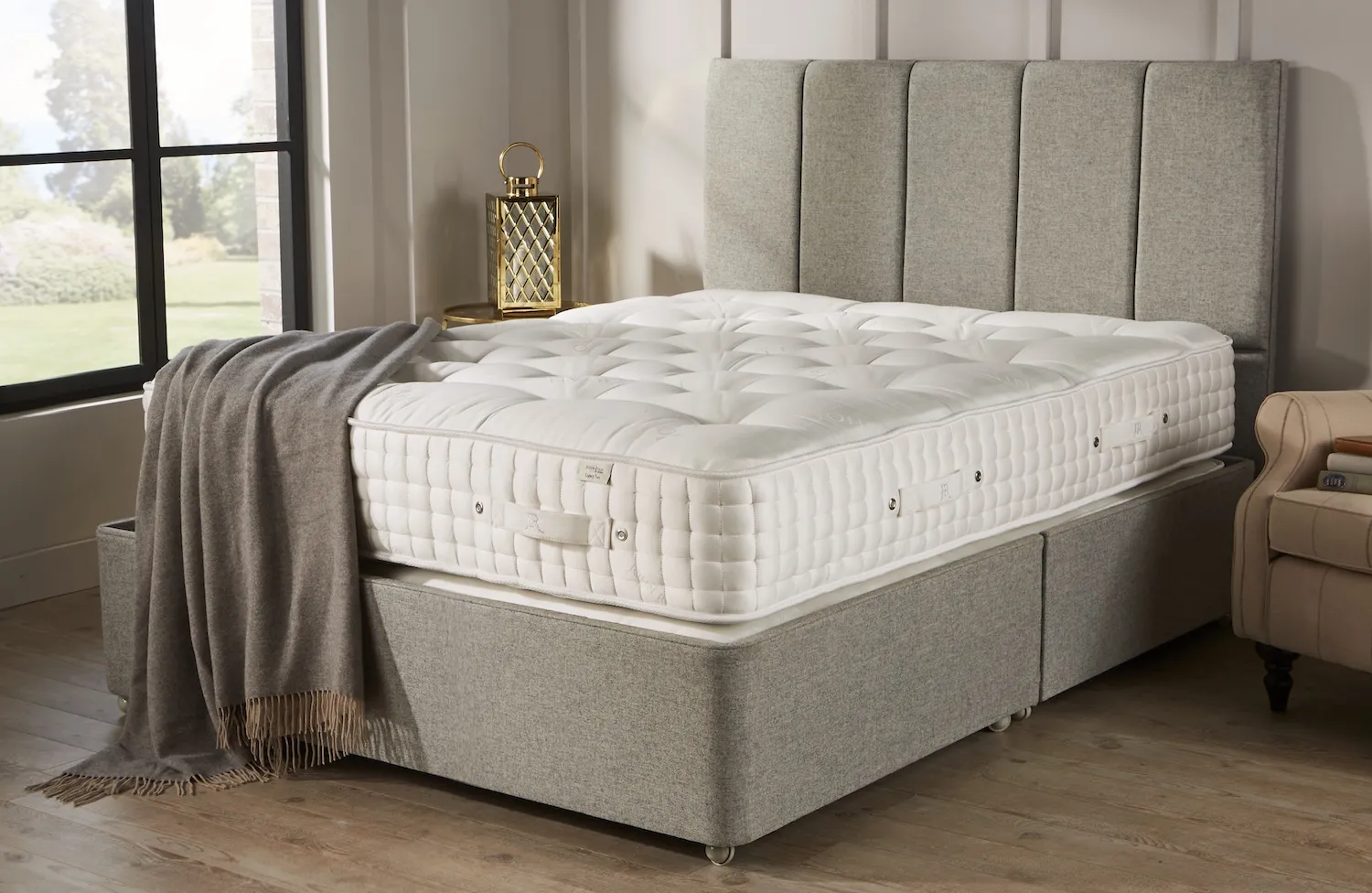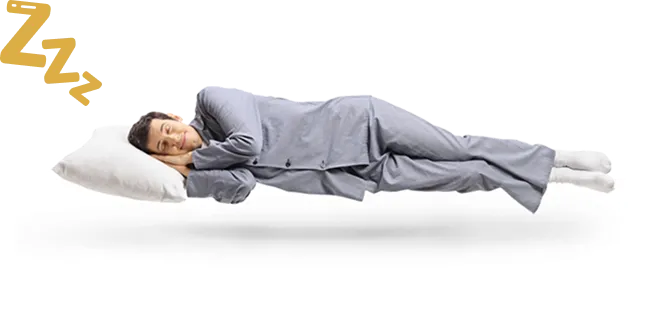Mattress Science, Mattress Choices
August 2024What’s the Best Organic Mattress?

There are a lot of misconceptions going around, so let’s start with the basics…
What is an Organic Mattress?
Before we explore our mattresses that could qualify as organic, we first need to get something important out of the way: this is the idea that organic mattresses are 100% organic!
The reason for us saying this becomes quite obvious when you stop and consider the make-up of mattresses. For instance, mattresses contain components like springs, and these are not all going to be 100% organic. Added to that, when a mattress maker claims to offer a “natural organic cover”, it’s meaningless unless they’re transparent about the GSM of a material, what it’s been treated with (to make it fire retardant) or its depth and thickness.
Whilst we make sure that we always give you this information, not every mattress manufacturer does. This is why we tend to advise caution when you’re faced with claims like “organic”. In our experience, such labels tend to show that a mattress is organic… to a point!
When the organic label is on food, people rightly think that it should signify something that’s 100% organic in terms of seed, soil and harvest approaches. With mattresses, it’s usually rather different.
When you see an organic label on something like wool, an interpretation of “100% organic” would only be applicable if:
- The sheep were fed using purely organic grass.
- The grass seed was grown exclusively on organic soil.
- There was no use of pesticides and chemicals.
- The wool hasn’t been wrapped in single-use plastic for delivery.
As you can imagine, there are very few farmers who would be willing to guarantee that every step of their processing is organic. What the label “organic” therefore tends to mean is “semi-organic”!
Likewise, something like latex is commonly labelled as being organic. However, unless those trees have categorically been grown in organically certified soil right from the start, they’re likely to be semi-organic. Organic latex certainly does exist, but given that latex trees take 7 years to cultivate before they can be harvested, a truly organic producer would have to set up organic soil a long time in advance and then wait for the trees to be harvested!
What we’re saying is that any mattress manufacturer that claims to offer a mattress with 100% certified organic materials could be misleading you, especially if it comes with a low-end price tag!
So, what’s an organic mattress for us?
We’d define an organic mattress as a product that embraces “an organic approach” to all fibres and products. There would also need to be an avoidance in the use of pesticides and herbicides in the creation of the mattress’s fibres or materials.

Why Buy an Organic Mattress?
Now that we’ve defined what an organic mattress is, we’d like to spend a bit of time convincing you about why they’re good to ensure a perfect night’s sleep! The environmental benefits go without saying, but do you, the owner, get any benefits from owning an organic mattress? The short answer is yes, you do…
- Organic mattresses are healthy. Organic mattresses are made from natural fibres and materials. Think wool, alpaca fibres, horsehair, mohair and the like, as opposed to synthetic fibres. Because of the lack of synthetic materials, they’re better for you in terms of health. This is because they’re breathable and haven’t been created in a factory using chemical soups and mixes. A possible exception to this rule would be if you’re looking for a hypoallergenic mattress. It’s true that organic mattresses don’t tend to absorb moisture, which makes them resistant to mould and allergens, but wool and horsehair can be problematic. Synthetic man-made fibres tend to be hypoallergenic by default, but then again natural cotton is also a fantastic hypoallergenic choice. If you do have a need for a hypoallergenic mattress then it’s worth reviewing your options, but be aware that an organic mattress may still work for you!
- Organic mattresses are comfortable. This is another benefit that comes from natural fibres. A well-made organic mattress is far more likely to contour to your body than a cheaper synthetic mattress. Natural fibres have a greater resilience and bounce back, compared to synthetic fibres which crush and flatten easily. This means you’ll get better support, and better sleep quality.
- Organic mattresses have good temperature regulation. Because organic mattresses major on natural fillings, they tend to be the most breathable mattresses there are. This is because they are naturally high wicking. This quality is great news for people who get too warm while they’re sleeping. Breathability is also a big reason why organic mattresses will be resistant to things like dust mites, which is a bonus.
- Organic mattresses are durable. High-quality natural materials – like you’ll find in our mattresses – are often more likely to last longer than a synthetic alternative. The old adage that “you get what you pay for” applies to natural and organic fibres. This is why many of our natural fibre mattresses come with a 10-year guarantee.
- Organic mattresses are eco-friendly. We said earlier that it goes without saying, but of course, it’s probably worth saying it again anyway. Organic materials are likely to be grown and processed according to eco-friendly methods and ethical practices, and many of the components within them will be biodegradable. This reduces landfill waste. Most organic mattresses are fully recyclable at the end of their life via something like our mattress recycling option.
Our Best Organic Mattresses
As we’ve said, we take issue with the term “organic mattress” when it’s used to suggest that every fibre in a mattress is 100% organic every step of the way. However, based on our above definition that an organic mattress should have a natural approach that shuns pesticides and herbicides, our best organic mattresses are:
Artisan Latex – a 100% Plant-Based Vegan Mattress

We’re proud to call the Artisan Latex a vegan mattress! It is 100% plant-based and made entirely from materials that are 100% free from animal by-products. The 3150GSM fibres feature natural bamboo, rebound cotton, organic flax, Talalay latex, and coir coconut fibre, so they are totally vegan-friendly. There are very few genuinely vegan mattresses on the market, and this one also happens to provide deep comfort for the sleeper and a 1500 pocket spring unit for support.
Legacy Two – 100% Chemical-Free Natural Fibres

The Legacy Two mattress is made from 100% traceable natural fibres (with a GSM of 5400) . This means that all of the fibres within this mattress are sourced from independent natural fibre artisans in the UK. The handwoven alpaca wool comes from animals that are reared in the UK, and the Swaledale wool, horsetail and organic flax are likewise fully traceable. This blend of fibres also makes the mattress fantastically breathable, so there’s no chance of any excess heat buildup.
Don’t forget that our organic mattresses are not only constructed in an environmentally minded way but also handcrafted in the UK. This further reduces the impact of our mattresses on the environment, which is a key consideration for organic buyers. It also better supports the UK economy, so it is a win-win situation. Additionally, we’re committed to ensuring that there are…
No Nasty Chemicals in (or on) our Mattresses!
In the case of the above two mattresses, we’d like to highlight the viscose plant-based mattress covers that they use. These are finely woven, highly durable, and breathable, and they use a plant-based fire retardant that’s good for you and good for the environment.
If you know anything about mattresses, you’ll know that their single biggest chemical concern stems from flame retardant chemicals, because a lot of them are connected to herbicides and pesticides. If you’re concerned about your mattress containing toxic chemicals then you should always check with the manufacturer or the retailer. If they try to avoid the question, then it goes without saying that this isn’t a good sign!
Some of the other usual suspects for chemicals within mattresses include memory foam and spray adhesives that may not be used in the mattress’s construction, but that can be added afterwards. You should be able to push for an accurate answer about chemical usage from any retailer or manufacturer. And be aware that chemicals can be added to mattresses that bill themselves as natural or even organic. Neither description guarantees no chemicals; you need confirmation that no harmful chemicals have been used in a mattress, and it does not depend on assumptions. This is why we didn’t mention “chemical free” as an innate benefit of organic mattresses earlier in this article. However, we’re very happy to firmly nail our colours to the mast and say that our mattresses contain no nasty chemicals.
All Your Organic Mattress Questions Answered
Throughout this article, we’ve mentioned the difficulties that a lack of transparency can pose to someone who wants to buy an organic mattress. After all, if you aren’t being told exactly what is in your mattress, how can you really be sure that it’s organic? Because of that, you need to find a manufacturer who’s prepared to be honest with you, which is precisely what you can expect from us.
If you’re keen to purchase an organic mattress and would like some more information then don’t hesitate to get in touch with our friendly team of experts. We’d be more than happy to give you as many details about our mattresses as you need to set your mind at ease, and also recommend a product that’s suitable for your requirements.

Dreaming of the perfect nights sleep?

Ask us a question
There are over 6000 questions and answers submitted by you on all questions about mattresses and bed problems. Enter a keyword such as Vi Spring, John Lewis beds, bad back or Memory Foam and see if your question has already been answered.
If you can’t find an answer in knowledge hub, ask a new question. We aim to respond to all questions within one working day.
Newsletter
Enter your email to join our newsletter. We’ll send you occasional news and mattress expertise.
